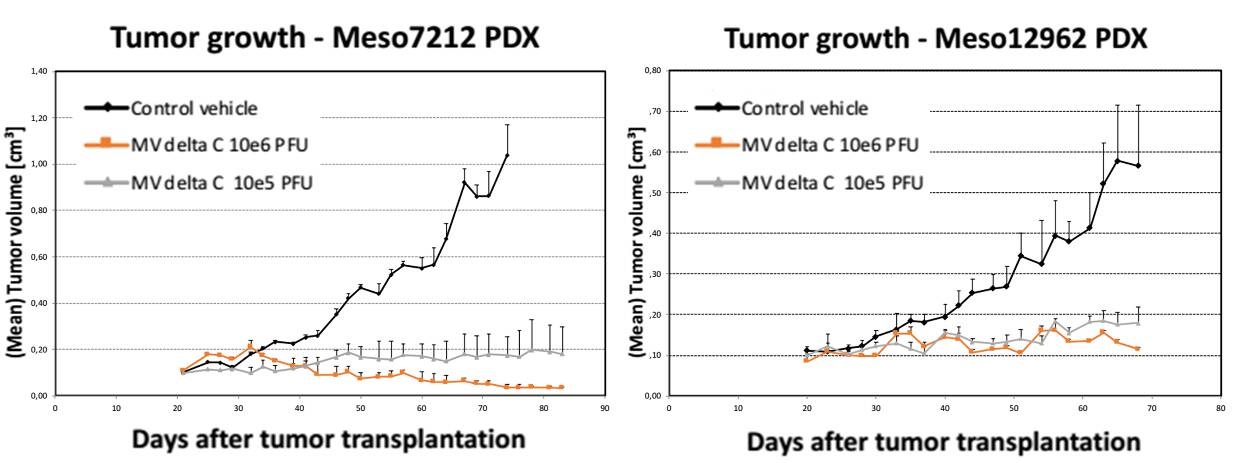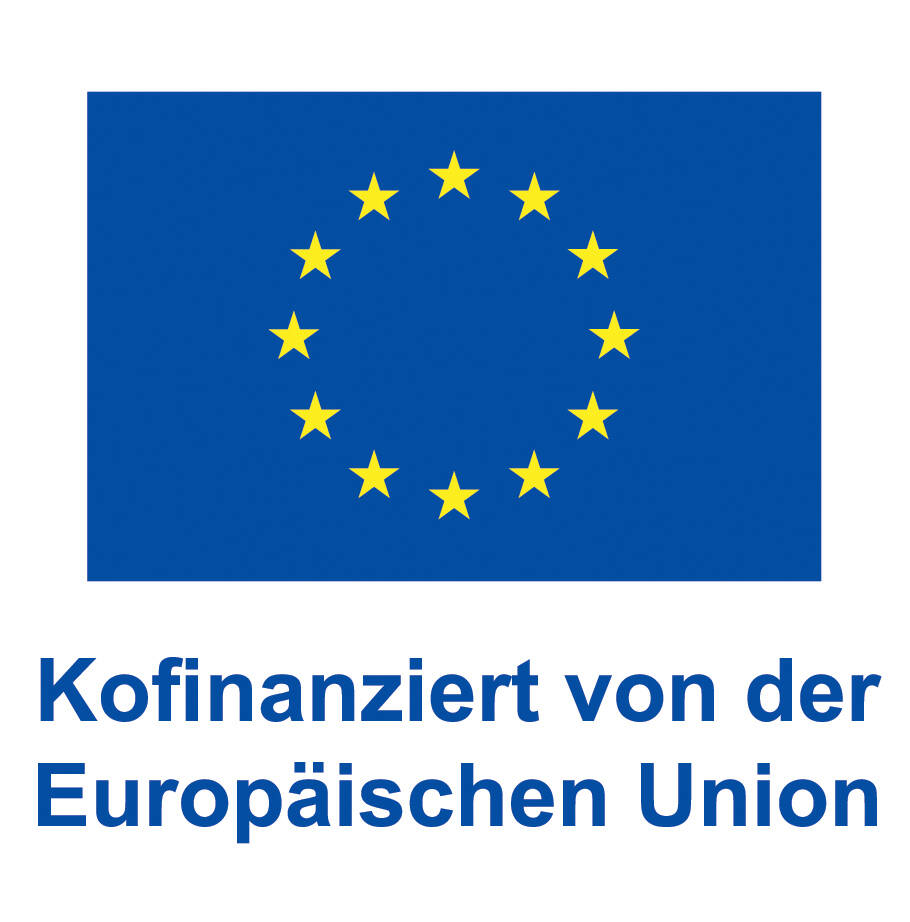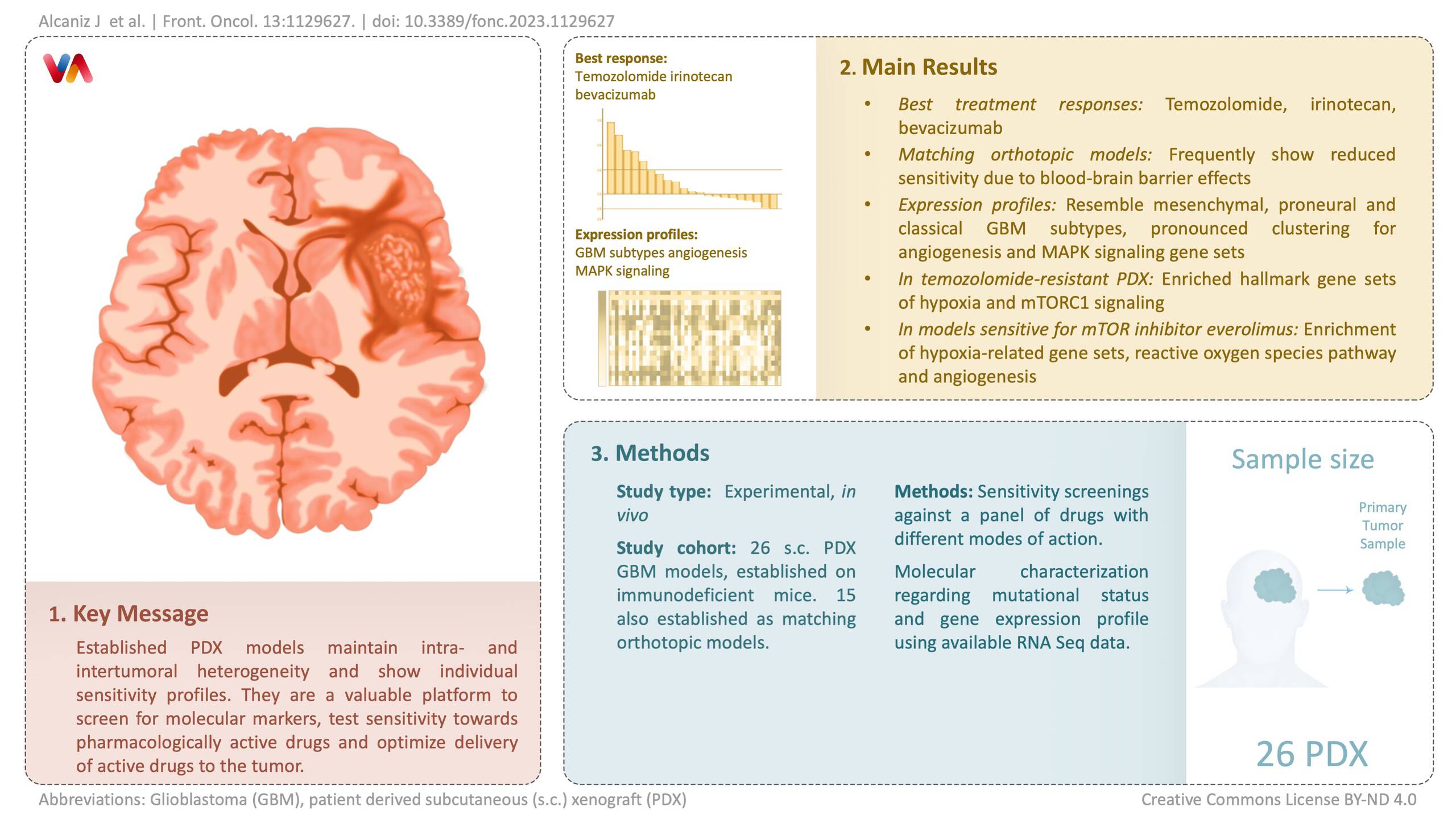Newsletter archive
Newsletter April 2025
Join us at EPO's Spring Meeting 2025

Dear Colleague,
The EPO team cordially invites you to attend the EPO 2025 Spring Symposium on June 11th at the historic Langenbeck-Virchow-Haus in the heart of Berlin.
After last year's successful meeting, we are pleased to once again provide a platform for scientists, clinicians and industry professionals to share their latest findings and discuss the challenges and opportunities in tumor modeling.
During the day, scientific presentations will be accompanied by networking opportunities and a joint lunch for in-depth discussions. We look forward to welcoming you and sharing our knowledge and expertise on new developments in tumor modeling. Please find a list of all speakers below and details in the attachment.
As space is limited, please register with Turn on Javascript!. We look forward to seeing you in Berlin on June 11th!
Best wishes,
Jens Hoffmann & Wolfgang Walther & Antje Wengner
CEO & CSO & CSO at EPO
Confirmed speakers are:
Ulf Kahlert – Universität Magdeburg
Peña Quim – RWTH Aachen
Rogier Versteeg – Charité Universitätsmedizin Berlin
Michael Launspach – Charité Universitätsmedizin Berlin
Markus Tiemann – FU Berlin
Joshua Alcaniz – EPO GmbH Berlin-Buch
Michelle Zimmer – EPO GmbH Berlin-Buch
Maria Stecklum – EPO GmbH Berlin-Buch
Mathias Dahlmann – EPO GmbH Berlin-Buch
Antje Wengner / Wolfgang Walther / Jens Hoffmann – EPO GmbH Berlin-Buch
Newsletter March 2025
AACR 2025 | Chicago

Join EPO for a Dinner Reception at the River North Bistro
Dear Colleague,
Are you looking forward to attending AACR 2025 and experiencing the vibrant heart of downtown Chicago?
We’re excited to invite you to a special evening reception at River North Bistro on Sunday, April 27, 6:00pm - 9:00pm, just steps away from Chicago’s iconic Magnificent Mile.
Enjoy a relaxed atmosphere with handcrafted cocktails and a selection of delicious bites while catching up with colleagues and friends. We’ll also share the latest updates from EPO and how our innovative preclinical models are advancing oncology drug development.
Secure your spot by signing up with Turn on Javascript!.
We’re also thrilled to showcase our latest scientific advancements at AACR 2025. Visit our poster and talk sessions to discuss your drug development strategies with our experts and learn how EPO’s preclinical tumor models can accelerate your oncology research.
We look forward to seeing you in Chicago!
Best regards,
Jens Hoffmann (CEO), Wolfgang Walther (CSO), Antje Wengner (CSO)
EPO Berlin-Buch
Talks
Triple negative breast cancer (TNBC) PDX models for preclinical investigation of novel therapies
Speaker: Jens Hoffmann (presenting on behalf of Diana Behrens)
Session Date & Time: April 28, 2025 | 2:30 PM – 4:30 PM
Session Type: Minisymposium
Session Category: Tumor Biology
Session Title: Cancer Models: Mechanisms and Therapies
Abstract Number: 3823
Abstract
Molecular profiles and drug response of ITCC-P4 patient-derived xenograft pediatric cancer models for target identification and prediction of targeted therapies
Speaker: Dennis Gürgen
Session Date & Time: April 27, 2025 | 3:00 PM – 5:00 PM
Session Type: Minisymposium
Session Category: Tumor Biology
Session Title: Advancing the Science of Childhood Cancers: From Bench to Bedside
Abstract Number: 1202
Abstract
Posters
The ITCC-P4 consortium: Deep molecular characterization of pediatric cancer xenograft (PDX) models enable prediction of novel personalized combination treatment options for patients with childhood cancer
Presenter: Dennis Gürgen
Session Date & Time: April 27, 2025 | 2:00 PM – 5:00 PM
Session Category: Clinical Research
Session Title: Targeted Therapies and Combinations 1
Location: Poster Section 34 | Board #28
Abstract Number: 840
Abstract
Long-term humanization of NOG mice and next-generation NOG strains to induce lineage-specific differentiation of immune cells for assessment of novel immune cell therapies, check point inhibitors, and immune cell engagers for translational immuno-oncology research.
Presenter: Maria Stecklum
Session Date & Time: April 30, 2025 | 9:00 AM – 12:00 PM
Session Category: Immunology
Session Title: Novel Animal Models / Tumor Antigenicity/Processing and Presentation
Location: Poster Section 37 | Board #4
Abstract Number: 7228
Abstract
Newsletter March 2025
Dear Colleagues,
Oncolytic virotherapy is gaining renewed attention leveraging viruses that naturally or genetically prefer tumor cells, this approach has the potential to reshape cancer treatment strategies.
Why Oncolytic Virotherapy is Rapidly Gaining Interest Among Oncology Researchers:
- Broad Viral Platforms – Both DNA-based (adenovirus, poxvirus, herpes simplex virus) and RNA-based (VSV, coxsackie virus, reovirus, NDV, measles virus) platforms are under investigation for clinical applications.
- Selective Tumor Infection – Oncolytic viruses specifically target and infect tumor cells while sparing healthy tissues.
- Replication & Spread in Tumors – Oncolytic viruses rely on tumor-specific factors, such as p53 mutations, Wnt/beta-catenin signaling, and defective type I IFN pathways, to replicate and propagate within the tumor.
- Immune System Activation – Beyond direct tumor destruction, oncolytic viruses reshape the tumor microenvironment to enhance immune recognition and anti-tumor responses
EPO has a strong track record in preclinical research on oncolytic virotherapy, with extensive experience in both standalone and combination approaches.
Our Expertise Includes:
- Oncolytic Virus Evaluation – Assessing the efficacy of oncolytic viruses across a range of solid tumor models.
- Combinatorial In Vivo Studies – Investigating the synergy between oncolytic virotherapy and immunotherapies, particularly immune checkpoint inhibitors.
- Immune Response Analysis – Conducting in vitro and in vivo assays to measure the impact of oncolytic viruses on anti-tumor T and B cell activity.
Supporting Oncovita’s Measles Virus-Based Therapy
A recent collaboration with Oncovita highlights EPO’s role in advancing oncolytic virotherapy. Our PDX models were instrumental in evaluating Oncovita’s measles virus-based candidate, MVdeltaC, demonstrating robust viral oncolysis and immune engagement.

For more details, or to discuss potential collaborations, please contact Turn on Javascript!. We look forward to advancing your oncolytic virotherapy research with our knowledge and expertise.
Best regards,
Jens Hoffmann (CEO), Wolfgang Walther (CSO), and Antje Wengner (CSO)
EPO Berlin-Buch
Newsletter March 2025
Welcome Dr. Antje Wengner!
Dear Colleagues,
We are pleased to announce that Dr. Antje Wengner has joined EPO Berlin-Buch as our Chief Scientific Officer!

With nearly two decades of leadership experience in the pharmaceutical industry, including roles as Senior Scientist, Project Leader, Laboratory Head and expert in in vivo pharmacology in Oncology Research at Bayer AG, Antje brings a wealth of scientific and tec.
Antje studied biology at the Humboldt University in Berlin, received her PhD in cell biology from the Max Delbrück Center in Berlin and completed a post-doctoral position at Imperial College London.
Her in-depth knowledge of oncology drug development and deep expertise in pharmacology, particularly in vivo, will further strengthen EPO's leadership in supporting our clients and their programs. Antje will play a key role in advancing our scientific expertise, expanding our portfolio and driving innovative solutions for our clients, with Prof. Wolfgang Walther guiding the transition over the next few months to ensure a smooth handover.
Please feel free to contact Antje directly at Turn on Javascript!
or via LinkedIn.
We look forward to an exciting journey together!
Best regards,
Jens Hoffmann & Wolfgang Walther
CEO & CSO at EPO Berlin-Buch
Newsletter February 2025
Advancing Radiation Therapy

Dear Colleagues,
EPO is pleased to share exciting updates on our capabilities in radiation therapy. As part of our ongoing commitment to expanding translational models and treatment strategies, we are leveraging our irradiator for advanced radiation therapy applications.
Tumor Irradiation for Preclinical Studies
EPO has successfully conducted numerous customer-driven irradiation studies, demonstrating the effectiveness of our radiation therapy models. Our irradiator delivers controlled dosimetry, ensuring reproducible treatment conditions for reliable study outcomes. This system offers versatile applications, supporting both localized and whole-body irradiation studies. With established preclinical experience spanning decades.
X-Ray Irradiation System
- Faxitron MultiRad 160 X-Ray System: Enables irradiation of animals or cells.
- Irradiation Schedules: Simulate irradiation schedules during the drug discovery process.
- Dose Rates: Irradiate animals or cells at clinically relevant dose rates (up to 300 Gy/min) in a uniform or local field.
Advanced Applications of Radiation Therapy
- Therapeutic Radiation: Evaluate the effects of radiation on tumor cell proliferation.
- Myeloablation: Radiation of immunocompromised mice for supporting human tumor, stroma, and stem cell engraftment.
- Combination Therapy: Radiation therapy combined with chemotherapy, targeted therapies, and immunotherapy.
- Radiation Sensitivity of HNSCC PDX: Evaluation of radiochemo or radioimmuno combinations.
Enhancing Our Radionuclide / Radioimmunotherapy Capabilities
EPO is delighted to announce the launch of new facility capabilities for radionuclide therapy applications. Radioimmunotherapy in preclinical cancer models has a long history at EPO, and we are already approved for many frequently used radioactive isotopes (new approval requests available).
New Radionuclide Configuration Includes:
- Wizard 1480 Gamma-Counter from PerkinElmer
- ISOMED 2010 Dose Calibrator from Nuviatech Healthcare
Both instruments enable highly sophisticated study designs for biodistribution studies and efficacy trials. Precise assessment of organ and tumor activity after dosing with radionuclide compounds is now available to support projects aimed at developments in nuclear medicine.
For more details or to discuss potential collaborations, please contact Turn on Javascript!?subject=Newsletter%20Epo%20GmbH" target="_blank" title="Email-Dr. Dennis Gürgen">Dr. Dennis Gürgen. We look forward to advancing your oncology research with our expanding radiation therapy portfolio.
Best regards,
Jens Hoffmann & Wolfgang Walther
CEO & CSO at EPO Berlin-Buch
Newsletter January 2025
Tumor Model Updates: Expanding EPO's PDX Library

Dear Colleagues,
Happy New Year! We hope your 2025 is off to a great start. Here at EPO, we are looking forward to another productive year of collaboration and innovation with our partners in industry and academia.
In driving this goal, we are thrilled to share updates on the continuing expansion of our tumor model offerings which now proudly include:
- 1000+ Highly Characterized in vivo PDX Models and in vitro PDX-Derived Cell Lines
- 400+ Pediatric PDX Models – Through collaboration with Innovative Therapies for Children with Cancer Pediatric Preclinical Proof-of-Concept Platform (ITCC-P4).
- Humanized Mouse Models – Engrafted in-house with CD34+, PBMCs, Stromal Cells, and MSCs, ensuring the Highest Quality for Immuno-Oncology Studies.
- Hematological Models – Including Acute Lymphoblastic Leukemia (ALL), Acute Myeloid Leukemia (AML), B-Cell and T-Cell Lymphoma.
- Orthotopic / Metastatic Models – PDX, CDX, and Syngeneic Ortho / Mets Models available with Bioimaging for Luc Tagged Lines.
- CDX and Syngeneic Models – Covering All Major Tumor Types: Breast, Lung, Colon, Fibrosarcoma, Leukemia, Renal Cell, Melanoma, etc.
All of our models have been rigorously validated and characterized yielding sharable Proteomic, Transcriptomic, RNA-Seq, Molecular, and Treatment Response Data.
Highlighted below are some recent publications demonstrating the value of our PDX Models and their Characterization Data in advancing oncology drug development.
- Cancers, 2023: Development of pancreatic cancer PDX models for molecular analyses and chemosensitivity testing.
- Frontiers in Oncology, 2023: Insights into glioblastoma PDX models and temozolomide resistance.
- Molecular Cancer, 2021: Predictive molecular signatures in colorectal cancer PDX models for personalized treatments.
Advancing therapies for Treatment Resistant Cancers creates a need for tumor models that faithfully recapitulate the treatment resistance seen in clinic.
To this end, EPO offers PDX models with both Innate Resistance to SOC treatments and Induced Resistance to drugs like Doxorubicin, Vincristine, and Cetuximab.
Meet Us at the Tumor Models San Francisco Summit to Learn More!
We are excited to attend this year’s Tumor Models San Francisco Summit from January 29–31 at the Grand Hyatt San Francisco. Visit our booth to meet Turn on Javascript! and Turn on Javascript! for an expert discussion on how EPO’s tumor models can accelerate your oncology drug development.
We look forward to continuing our partnerships and supporting your breakthroughs in 2025!
Best regards,
Jens Hoffmann & Wolfgang Walther
CEO & CSO at EPO Berlin-Buch
Newsletter December 2024
EPO End of Year Summary

Dear Colleagues,
As the year draws to a close, we extend our warmest holiday greetings and heartfelt thanks for trusting us to partner with you in accelerating your preclinical oncology drug development programs. This year has been a remarkable journey in advancements in preclinical oncology research. We've supported advancements across a spectrum of tumor types, treatment modalities, and in vivo / in vitro disease models.
We are also proud to announce the establishment of EPO-Oncodiscovery, our new U.S.-based site. This expansion strengthens our ability to connect with clients and partners across North America, attend key oncology conferences, and provide localized expertise in preclinical oncology drug development.
Key Highlights from our Newsletters in 2024:
Kicking off the year strong with EPO’s published work in Cancers on 45 pancreatic carcinoma PDX models, highlighting their value in preclinical drug testing and personalized therapy development.
Read More
February 2024: Advancing T-Cell Therapies through Collaboration
EPO Berlin-Buch secures funding from the ProFIT program and the EU (EFRE) to support a collaborative project on TCR-T therapies targeting pancreatic, colorectal, and breast cancers driving development of innovative and personalized therapies.
March 2024: EPO Highlighted at AACR
At AACR in San Diego, EPO hosted a lively reception and presented groundbreaking research on immune oncology and predictive tumor models, connecting with colleagues and showcasing our latest scientific advancements.
May 2024: Advancing Glioblastoma Research
At the Brain Tumor Meeting in Berlin, EPO presented updates on our glioblastoma (GBM) research, showcasing our comprehensive PDX models and new glioma cell lines, while discussing their potential for accelerating drug development.
June 2024: EPO's Role in Advancing Pediatric Cancer Research
Through EPO’s collaboration with ITCC-P4, we continue to drive pediatric cancer research by providing access to over 400 well-characterized patient-derived pediatric PDX models
July 2024: Tumor Models Boston Summit
Showcasing EPO’s latest advancements in translational oncology models, focusing on de-risking target validation, predicting therapeutic responses, and supporting biomarker discovery
August 2024: EPO Advances Breast Cancer Research
EPO makes continued strides in breast cancer research with our robust PDX portfolio, including 15 models for Triple-Negative Breast Cancer (TNBC) and the development of Invasive Lobular Carcinoma (ILC) models.
September 2024: Advancing Tumor Resistance Models at EPO
EPO continues to advance tumor resistance models, integrating chemosensitivity data and genomic insights to elucidate mechanisms of drug resistance and empower development of new more effective therapies.
November 2024: ADC Advancements and Innovations at EPO
EPO is advancing research and showing promising efficacy in Antibody-Drug Conjugates (ADCs) and Small Molecule-Drug Conjugates (SMDCs) for Triple-Negative Breast Cancer (TNBC) and other hard-to-treat cancers.
Thank you for your continued partnership and support. We look forward to driving more advancements together in the coming year.
For inquiries, please contact Turn on Javascript! or Turn on Javascript!, or reach out directly to our business development representatives, Turn on Javascript! (EPO-USA) and Turn on Javascript! (EPO-Berlin), to discuss how we can accelerate your drug development program.
Best regards,
Jens Hoffmann & Wolfgang Walther
CEO & CSO at EPO Berlin-Buch
Newsletter November 2024
ADC Advancements and Innovations at EPO

Dear Colleagues,
We are excited to share updates on our advancements in Antibody-Drug Conjugate (ADC) and Small Molecule-Drug Conjugate (SMDC) research, powerful tools in targeted cancer therapies. EPO has made significant contributions to several groundbreaking studies.
Evaluation of ADCs in PDX Tumor Models at EPO-Berlin
EPO’s PDX models have been used in several recent developments in ADC research, including validating the efficacy and tolerability of Oncofetal Chondroitin Sulfate (ofCS)-targeting antibody fragments as ADCs in Pancreatic Ductal Adenocarcinoma (PDAC).
Studies in our IL3RA-positive AML11655 model, treated with IL3RA-targeting ADCs, demonstrated improved survival and reduced tumor burden.
Our models have also validated the efficacy of Mesothelin targeting ADCs in Ovarian Cancer and Mesothelioma, and of C4.4A-targeting ADCs in on-Small Cell Lung Cancer (NSCLC), highlighting the success of ADCs in treating Squamous Cell Carcinoma (SCC) subtypes.
Experiments in CAIX-targeting ADCs revealed selective shrinkage in our CAIX-Overexpressing PDX models, particularly within SCC subtypes.
Elucidating Combination Therapy in ADCs
Studies in our PDX models have demonstrated enhanced efficacy in ADCs when combined with Standard-of-Care (SoC) chemotherapy, revealing key insights into ADC Targeting and Internalization.
Developing SMDCs for Treatment of Triple-Negative Breast Cancer (TNBC)
A Study in two of our Orthotopic Metastatic TNBC models, treated with an αvβ3-targeting SMDC resulted in long-lasting tumor regression and reduced brain and lung metastases.
Similar efficacy was demonstrated in our Subcutaneous PDX models of Non-Small-Cell Lung, Colon, and Renal Cancers, highlighting the potential of SMDCs for difficult to treat metastatic cancers.
“Methodology” Spotlight on IncuCyte for in vitro ADCs
We are leveraging IncuCyte technology to generate in vitro ADC data for validation of ADC effectiveness in tumor-targeting and for providing insights into drug efficacy and resistance mechanisms.
Highlighting Recent Publications:
- Nat Commun (2024): Novel antibody fragments targeting Oncofetal Chondroitin Sulfate (ofCS) conjugated to MMAE were evaluated in PDX models of PDAC and UPS at EPO-Berlin, demonstrating robust efficacy.
https://pubmed.ncbi.nlm.nih.gov/39215044/
- Cancers (2023): VIP236 (SMDC targeting αvβ3) designed and tested in PDX models of NSCLC, CRC, and TNBC at EPO-Berlin, demonstrating improved survival, reduced tumor burden, and significant antitumor efficacy.
https://pubmed.ncbi.nlm.nih.gov/37686656/
- Cancers (2020): IL3RA-targeting ADCs were evaluated in PDX models of AML11655 at EPO-Berlin, demonstrating improved survival, reduced tumor burden, and significant antitumor efficacy.
https://pubmed.ncbi.nlm.nih.gov/33233768/
- Oncotarget (2018): Mesothelin targeting ADC was evaluated in PDX models of Mesothelin-Expressing Ovarian Cancer at EPO-Berlin, demonstrating potent antitumor activity both in monotherapy, and in combo with SoC.
https://pubmed.ncbi.nlm.nih.gov/30344925/
- Mol Cancer Ther (2017): C4.4A-targeting ADCs was evaluated at EPO-Berlin in two human CDX and four PDX models of NSCLC models in vivo, highlighting its efficacy in squamous cell carcinoma.
https://pubmed.ncbi.nlm.nih.gov/28292941/
- Mol Cancer Ther (2014): Mesothelin-targeting ADC (MF-T conjugated to DM4) evaluated in PDX models of Mesothelin-Expressing Cancers (Mesothelioma, Ovarian) at EPO-Berlin, demonstrating high selectivity and antitumor efficacy.
https://pubmed.ncbi.nlm.nih.gov/24714131/
- Molecular Cancer Therapeutics (2012): CAIX-targeting ADC (mAb 3ee9 conjugated to MMAE) demonstrate potent antitumor efficacy across multiple PDX CAIX-Overexpressing Solid Tumor models in studies at EPO-Berlin.
https://pubmed.ncbi.nlm.nih.gov/22147747/
Our colleague Turn on Javascript! is attending this year’s ADC Conference in San Diego (Nov 4–7) and will also be in San Francisco (Nov 7–8); reach out to arrange an in-person meeting or video call with him.
For more information, contact Turn on Javascript! and Turn on Javascript!%3e" target="_blank">Prof. Wolfgang Walther to discuss how we can accelerate development of your therapeutic ADC.
Best regards,
Jens Hoffmann & Wolfgang Walther
CEO & CSO at EPO Berlin-Buch
Newsletter September 2024
Advancing Tumor Resistance Models at EPO
Dear Colleagues,
We are pleased to share the latest progress at EPO in developing tumor resistance models, a key area in preclinical oncology research. Understanding chemoresistance is essential for improving therapeutic strategies, and we continue to lead efforts in this field.
Extensive Chemosensitivity Data
Our broad Patient-Derived Xenograft (PDX) collection covers various tumor types, including solid tumors and leukemias.
With detailed data on chemosensitivity, we can provide models that are either sensitive or resistant to standard-of-care (SoC) drugs, allowing for innovative testing of resistance strategies.
Genomic Insights
We offer integration of chemosensitivity data with RNA sequencing and mutation datasets, available on request. This allows for deeper understanding of drug response and resistance mechanisms to improve research precision.
Induced Resistance Models
EPO has developed select PDX models with induced resistance to drugs like doxorubicin, vincristine, and cetuximab. These models are fully characterized to help identify resistance pathways and new therapeutic approaches.
Highlighting Recent Publications
One notable recent study in the Journal of Controlled Release was co-authored by our team members Dr. Diana Behrens and Prof. Wolfgang Walther. This research demonstrates the efficacy of paclitaxel-loaded polymeric micelles in treating triple-negative breast cancer (TNBC) using our paclitaxel-resistant PDX models.
We also share below recent publications that highlight the value of our PDX models in advancing drug resistance research:
Frontiers in Oncology, 2023: Insights into glioblastoma PDX models and temozolomide resistance.
For more information, contact Turn on Javascript!?subject=Newsletter%20Epo%20GmbH" title="Email-Dr. Dennis Gürgen">Dr. Dennis Gürgen or Turn on Javascript! to discuss how we can accelerate your therapeutic oncology development.
Best regards,
Jens Hoffmann & Wolfgang Walther
CEO & CSO at EPO Berlin-Buch
Newsletter August 2024
EPO is advancing Breast Cancer Research with Cutting-Edge PDX Models
Dear Colleague,
We are pleased to share that our research activities in the breast cancer field are making steady progress.
At the forefront of breast cancer research, our team has established a robust portfolio of 44 Patient-Derived Xenograft (PDX) models, including 15 Triple-Negative Breast Cancer (TNBC) models. These models represent a critical resource for understanding tumor biology and driving therapeutic innovation.
Our expertise extends to the development of orthotopic models that accurately replicate the metastatic process in vivo. These models not only metastasize in a manner consistent with human disease but can also be rigorously analyzed using PCR to track human cells, complemented by detailed histological examinations (POSTER). These capabilities have already been successfully applied to helping our partners with compound development.
In addition to our extensive PDX platform, we are pioneering the development of Invasive Lobular Carcinoma (ILC) models in collaboration with an academic partner. These rare models will become available to our clients in the long run.
Our commitment to innovation and precision in breast cancer research positions us as a key partner for advancing your therapeutic projects. Whether you are focused on TNBC, metastasis, or rare subtypes like ILC, our models and expertise are designed to support your goals and accelerate the development of new cancer treatments.
If you woud like to discuss your project and plans, please contact our subject matter expert, Turn on Javascript!, directly.
Best wishes,
Jens Hoffmann & Wolfgang Walther
CEO & CSO at EPO Berlin-Buch
Newsletter July 2024
Join us at Tumor Models Boston Summit
Dear Colleague,
We are thrilled to be part of Tumor Models Boston Summit July 23-24. We are hoping to see you at the conference and talk about latest advancements in our translational and predictive models and how we can assist in de-risk the validation of novel targets, predict therapeutic response, and support biomarker discovery.
Key topics include implementing state-of-the-art, reproducible and predictive oncology models to enhance target selection, facilitate biomarker discovery and facilitate clinical translatability.
Come by our booth and meet our CEO Jens Hoffmann and our colleague Joseph Herbert for an expert chat. We would also like to take this opportunity to welcome Joseph Herbert as our new Business Development colleague for the US. Joe brings a wealth of experience to the role, and we are thrilled to have him supporting our US clients. Please feel free to schedule a meeting with Joe and Jens in advance via this Turn on Javascript!.
We look forward to seeing you soon in Boston!
Best wishes,
Jens Hoffmann & Wolfgang Walther
CEO & CSO at EPO
12th Tumor Model Summit Boston
July 23-24, 2024
The Westin Boston Seaport District
425 Summer Street
Boston, MA 02210
Newsletter June 2024
EPO's Role in Advancing Pediatric Cancer Research
Dear Colleagues,
We are excited to share updates on EPO's pioneering efforts in pediatric cancer research. Through the Innovative Therapies for Children with Cancer Paediatric Preclinical Proof-of-concept Platform (ITCC-P4), we are offering a unique panel of 400 well characterized and annotated patient-derived pediatric xenograft (PDX) models.
ITCC-P4, a non-profit initiative, is passionately committed to a future free from childhood cancer. It provides the world’s most extensive collection of freshly patient-derived pediatric tumor models, enriched with comprehensive molecular and pharmacological data. This empowers advanced preclinical cancer research, crucial for meeting FDA guidelines in the approval of novel pediatric oncology drugs. https://itccp4.com/
By blending EPO’s scientific expertise with the knowledge of ITCC-P4’s globally recognized academic disease-experts, we strive to deliver excellent services to elevate your drug programs.
We are also delighted to announce steady progress in our pediatric research initiatives, with two new publications offering insights into pediatric cancer mechanisms and drug responses.
In a collaborative approach we have demonstrated that elimusertib shows potent preclinical antitumor activity in pediatric solid tumor models, potentially leading to significant clinical responses in patients. https://pubmed.ncbi.nlm.nih.gov/36753540/
Another publication highlights the RAS pathway as a promising therapeutic target for alveolar rhabdomyosarcoma (aRMS), a group of pediatric cancers with skeletal muscle characteristics. https://pubmed.ncbi.nlm.nih.gov/38159110/
We’re excited to harness our scientific expertise alongside leading pediatricians to elevate your drug programs. Please reach out directly to our subject matter expert Turn on Javascript!?subject=Newsletter%20Epo%20GmbH" title="Email-Dr. Dennis Gürgen">Dr. Dennis Gürgen for any queries or to discuss your project.
Best regards,
Jens Hoffmann & Wolfgang Walther
CEO & CSO at EPO Berlin-Buch
Newsletter May 2024
EPO is advancing in vitro and in vivo glioblastoma portfolio
Dear Colleague,
We are pleased to share that our research activities in the GBM space are progressing steadily and we will be showcasing our work at the Brain Tumor Meeting at the Max Delbrück Center, Berlin, May 23 to 24.
At the meeting, EPO will report on its thoroughly characterized glioblastoma (GBM) PDX models and the establishment of a new panel of matching GBM PDX-derived glioma cell lines. These PDX-derived cell lines show individual cell morphologies and growth pattern, as well as expression of established cancer stem cell markers.
By establishing and continously expanding our in vitro/in vivo GBM pipeline, EPO is able to perform rapid in vitro sensitivity screenings in association with selection of suited models for subsequent in vivo studies as valuable tool for accelerated drug development. We are excited to continue leveraging our capabilites and scientific expertise in the GBM space to our clients, providing the best possible service to enhance your drug programs.
Please connect directly with our subject matter expert Turn on Javascript! to discuss your project. Additionally, we invite you to explore our comprehensive overview poster providing a detailed glimpse into our GBM expertise. (POSTER LINK)
Best wishes,
Jens Hoffmann & Wolfgang Walther
CEO & CSO at EPO Berlin-Buch
Newsletter March 2024
Dear Colleague,
Will you be attending AACR in San Diego this year? We look forward to having you join us for a fun evening reception at the East Village Brewing Company on Monday April 8th! We will start at 7 pm with some welcome drinks followed by a short introduction to EPO’s newest developments.
Afterwards, we invite you to enjoy delicious burgers, wine and crafted beer and to connect with us and colleagues.
As space is limited, please sign up with Turn on Javascript!
We also proudly present our brand new scientific developments during the poster sessions. Stop by and chat with our experts about your drug development plans and how our preclinical tumor models and expertise can help advance your program.
Title: Integrated tumor models for immune oncology using live cell imaging for prediction of treatment efficacy in vitro and in vivo
Poster Section on 28, Poster Board 5 presented on Monday Apr 8, 9:00 AM - 12:30 PM
Title: Assessment of therapeutic antibody efficacy without the interference of murine Fc receptors allows for investigation of human antibody-dependent cellular cytotoxicity mediated by NK cells in the FcResolv™ hIL-15 NOG mouse model
Poster Section 10, Poster Board 23 presented on Monday Apr 8, 1:30 PM - 5:00 PM
Title: Humanization of NOG mice and next-generation NOG strains to induce lineage-specific differentiation of immune cells for assessment of novel immune cell therapies, check point inhibitors, and immune cell engagers for translational immuno-oncology research
Poster Section 4, Poster Board 14 presented on Tuesday Apr 9, 1:30 PM - 5:00 PM
We look forward to seeing you during the reception and our poster session!
Best wishes,
Jens Hoffmann & Wolfgang Walther
CEO & CSO at EPO
Newsletter February 2024


EPO Berlin-Buch will receive funding from the ProFIT program of the Investitionsbank Berlin and the European Union (EFRE, Europäischer Fonds für regionale Entwicklung) for participating on a collaborative research project on novel T-cell therapies. This joint project was initiated by the biotech companies HS Diagnomics and TheryCell together with partners from Charités Clinic of Hematology, Oncology & Cancer Immunology and Institute of Pathology.
The project's focus is on the development of T cell receptor (TCR)-T therapies for solid tumors, specifically targeting Pancreatic Ductal Adenocarcinoma, Colorectal Carcinoma, and Breast Cancer. The collaborative effort aims to identify therapeutic TCR’s from patients, ultimately leading to the establishment of both personalized and off-the-shelf TCR-T cell therapies.
EPO Berlin-Buch contributes with its extensive expertise in preclinical evaluation of novel cell and immune therapies for cancer patients. This multi-faceted collaboration holds promise for advancing research and contributing to the development of innovative and effective treatment options for individuals with these challenging types of cancers.
Newsletter January 2024
EPO panel of pancreas carcinoma PDX published in the journal Cancers
EPO has recently published its work on establishment and characterization of pancreas carcinoma (PC) PDX models in the peer-reviewed journal Cancers (Behrens D. et al., Establishment and thorough characterization of pancreatic cancer patient-derived xenograft (PDX) models for molecular analyses and chemosensitivity testing, Cancers (Basel), 2023, 15: 5753, PMID: 38136299).These models were generated in cooperation ...
... with clinical partners from Germany and Italy. By this, 45 PC‑PDX models were generated, which in the majority represent ductal adenocarcinomas (PDAC). The mutational profile of the PDXs, the sensitivity of the models toward standard of care (SoC) drugs gemcitabine, 5-fluorouracil, oxaliplatin, and abraxane, and combinations thereof were analyzed and correlated to the their molecular profile. This was done to reveal potential signatures for response or resistance of the PDAC PDX models to the drug treatments. In conclusion, this published study strongly supports the importance and value of PDX models for improvement of therapies of PC and offers new options for pre-clinical testing of more effective therapies to treat PC. (Weblink)
Newsletter October 2023
The colorectal cancer (CRC) PDX panel of EPO is part of a high impact study on CRC chemoresistance published in Molecular Cancer
Just recently, a high impact collaborative study has been published in Molecular Cancer ( Kendzia S et al. A combined computational and functional approach identifies IGF2BP2 as a driver of chemoresistance in a wide array of pre-clinical models of colorectal cancer. Mol Cancer; 2023, 22: 89, PMID: 37248468 )
on computational and functional analyses, which have used the CRC PDX of the oncotrack initiative, to which EPO has contributed a significant panel of CRC PDX models. The study identifies IGF2BP2 as most abundant in CRC, being associated with chemoresistance and which in conclusion represents a potential therapeutic target. The study supports the great value of CRC PDX pre-clinical models to reveal novel mechanisms of chemoresistance and to design new therapeutic resistance overcoming strategies for CRC. (Weblink)
Newsletter June 2023
New publication on glioblastoma (GBM) PDX models established and characterized at EPO
EPO has just recently published a new study on molecular characterization and chemosensitivity testing of its established glioblastoma (GBM) PDX model panel in the journal Frontiers Oncology.

EPO has just recently published a new study on molecular characterization and chemosensitivity testing of its established glioblastoma (GBM) PDX model panel in the journal Frontiers Oncology. Highlights of this study include:
- A panel of 26 patient-derived subcutaneous xenograft (PDX) GBM models was established and screened in immunodeficient mice, providing a valuable platform for studying GBM biology.
- Sensitivity to a drug panel with different modes of action was determined, revealing the best treatment responses for temozolomide (standard of care), irinotecan, and bevacizumab.
- Intracranial models, which mimic the tumor microenvironment in the brain, showed reduced drug sensitivity due to the blood-brain barrier limiting drug penetration to the tumor.
These findings provide significant insights into the heterogenous and complex biology of GBMs and offer a promising avenue for developing targeted therapies. Further research on molecular markers and drug optimization using this platform can pave the way for improved treatment options for GBM patients.
Newsletter February 2023
News on Renal Cell Cancer (RCC) PDX models established at EPO
EPO has recently published the study on thorough characterization of its panels of RCC PDX models in Frontiers Oncology (Gürgen et al., Fontiers Oncol, 12:889789, 2022). In the study, data on molecular ...
analyses of these models and their response toward drug treatment as well as correlation analyses on drug responsiveness and molecular profiles are presented. This publication demonstrates the value of such PDX models for pre-clinical testing to identify new therapeutic targets, molecular signatures and to evaluate novel therapeutic approaches.
Newsletter January 2023
Successful use of EPO’s NSCLC PDX models to develop novel combination therapy
EPO has established a panel of non-small cell lung cancer (NSCLC) PDX models, which currently have been successfully employed to test a novel approach for targeted drug combinations. This was done in collaboration with Stefan Langhammer from Life Science ...
Consulting and published in Communications Biology (Gürgen D et al., Comm Biol 5:59; 2022). Detailed molecular analyses of the NSCLC PDX signaling networks enabled identification of intervention points to more effectively prevent the development of drug resistance of these tumors. Based on this, treatment of EPO’s NSCLC PDXs with a combination of cabozantinib, afatinib, plerixafor and etoricoxib resulted in efficient overcoming of resistance for these tumors and an improved therapeutic outcome. This study is an excellent example that molecular data sets of PDX models can be used effectively for design and testing of novel therapy concepts.
Newsletter April 2022
AACR Annual Meeting 2022 in New Orleans
Dear Colleagues,
Unfortunately, the pandemic situation has just once again prevented us from attending the AACR meeting in person and has forced us to cancel our on-site poster presentations.
After a break of more than 3 years due to the pandemic, we were very much looking forward to meeting you again in person at this year's AACR and to share the latest developments on preclinical tumor models at the posters.
If you are attending the AACR, we look forward to a lively online poster discussion with you via the "AACR Annual Meeting 2022: E-Poster" webpage.
For those not attending the meeting, we are sending the link to our posters here:
Poster#1: Humanized mouse models for ...
Poster#2: Breaking the crosstalk of ...
Please contact us with any question: Turn on Javascript!?subject=AACR%20Annual%20Meeting%20in%20New%20Orleans&body=Dear%20Dr.Jens%20Hoffmann,">Dr. Jens Hoffmann
Best Regards
Jens Hoffmann
CEO